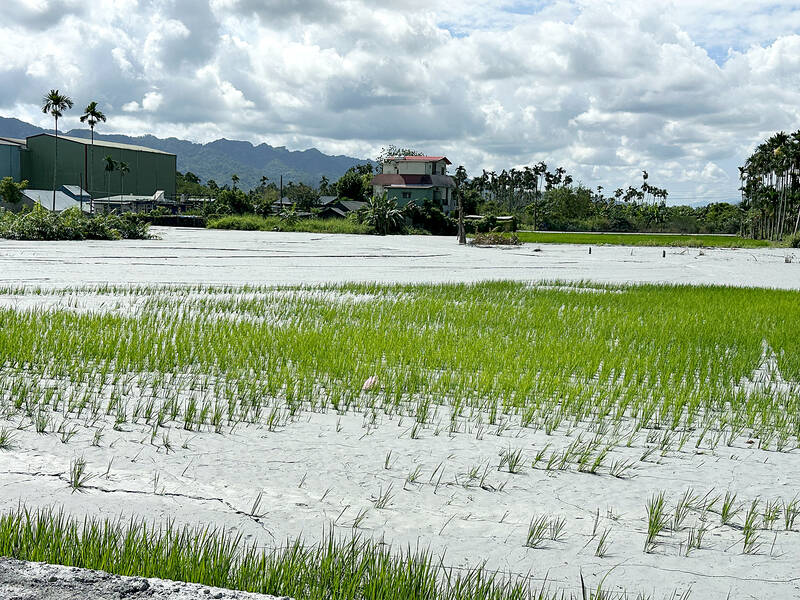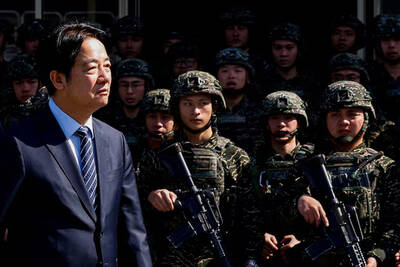Removing the 6 million cubic meters of post-flood silt on fields in Hualien County could take three years, the Ministry of Agriculture said yesterday, adding that partial removal combined with on-site reconstruction or farmland readjustment could be alternative solutions.
The Irrigation Agency Deputy Director-General Lin Kuo-hua (林國華) yesterday said the agency has drilled two wells that are supplying 1,480 tonnes of irrigation water per day to the 63 hectares of farmland in Guangfu (光復) and Fonglin (鳳林) townships unaffected by the barrier lake that burst.
Soil analyses showed the deposit on fields is composed mainly of coarse sand, which is covered with silty sand, he said.

Photo: CNA
Minister of Agriculture Minister Chen Junne-jih (陳駿季) said there were concerns whether the tiny particles of silty sand could affect produce growth, but an analysis of 30 samples showed the thickness of the silty sand layer is only 3 to 5cm and limited to the surface.
The underlying soil layers contain coarse sand, similar to the soil composition of farmland in the region, he said.
The investigation showed that levels of heavy metals in the floodwash did not exceed acceptable limits and would not affect either the soil or growth in the future, he added.
Chen said the two wells were built under the ministry’s emergency irrigation scheme to water the 63 hectares of unflooded farmland, with a 1km water pipeline installed to substitute for the blocked irrigation channels.
The flooded farmland in the two townships totals about 800 hectares and is covered with floodwash ranging from several centimeters to 6m in thickness, he said.
It would take at least three years to completely remove all the silt, which would require somewhere to put it, Chen said.
Complete silt removal would be difficult, Lin said, adding that another proposed solution is to reconstruct the farms at their original sites while removing some of the silt.
However, some flooded farms have residential housing, which would be situated below the surface level when surrounding silt is removed, he said.
Farmland readjustment — the third solution — is believed to be the most efficient, and could restart farming by planning suitable farm roads and irrigation lines for each plot of farmland, Lin said.
Farmland readjustment would be a lasting solution, Chen said, adding that all the three solutions were being explored.
“We will find out the solution that is most beneficial to agricultural workers and most sustainable for agricultural operations,” he said.
The government wants to hear local farmers’ opinions and seek to reach a solution with input from local agricultural communities to promote farmland rehabilitation in the region, he added.

The Taipei Mass Rapid Transit (MRT) Wanda-Zhonghe Line is 81.7 percent complete, with public opening targeted for the end of 2027, New Taipei City Mayor Hou You-yi (侯友宜) said today. Surrounding roads are to be open to the public by the end of next year, Hou said during an inspection of construction progress. The 9.5km line, featuring nine underground stations and one depot, is expected to connect Chiang Kai-shek Memorial Hall Station to Chukuang Station in New Taipei City’s Jhonghe District (中和). All 18 tunnels for the line are complete, while the main structures of the stations and depot are mostly finished, he

The first global hotel Keys Selection by the Michelin Guide includes four hotels in Taiwan, Michelin announced yesterday. All four received the “Michelin One Key,” indicating guests are to experience a “very special stay” at any of the locations as the establishments are “a true gem with personality. Service always goes the extra mile, and the hotel provides much more than others in its price range.” Of the four hotels, three are located in Taipei and one in Taichung. In Taipei, the One Key accolades were awarded to the Capella Taipei, Kimpton Da An Taipei and Mandarin Oriental Taipei. Capella Taipei was described by

Minister of Economic Affairs Kung Ming-hsin (龔明鑫) yesterday said that private-sector refiners are willing to stop buying Russian naphtha should the EU ask them to, after a group of non-governmental organizations, including the Centre for Research on Energy and Clean Air (CREA), criticized the nation’s continued business with the country. While Taiwan joined the US and its Western allies in putting broad sanctions on Russia after it invaded Ukraine in 2022, it did not explicitly ban imports of naphtha, a major hard-currency earner for Russia. While state-owned firms stopped importing Russian oil in 2023, there is no restriction on private companies to

President William Lai (賴清德) is expected to announce a new advanced “all-domain” air defense system to better defend against China when he gives his keynote national day speech today, four sources familiar with the matter said. Taiwan is ramping up defense spending and modernizing its armed forces, but faces a China that has a far larger military and is adding its own advanced new weapons such as stealth fighter jets, aircraft carriers and a huge array of missiles. Lai is expected to announce the air defense system dubbed “Taiwan Dome” in his speech this morning, one of the sources said. The system